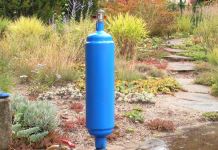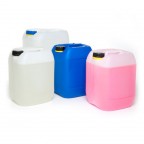In the heat exchanger the geothermal heat pump, the temperature of the coolant in the cold season is often negative, although the pump does not stop. For safety and reliability systems are used as coolant, antifreeze or whatever he’s called pickle. Brines today are made on the basis of different chemical components and different characteristics.
Because of the variety of coolants can be divided into four groups:
– alcohol-based coolants, of the advantages of low cost and low viscosity. They, in turn, are divided into contains methanol and contains ethanol. Both the first and second type have disadvantages. Сontains methanol fluids are toxicity and flammability and have poor lubricating properties. Contains ethanol heat transfer fluids are also flammable and have low conductivity.
– glycerin, in the form of benefits it is noted the cheapness of the coolants of this group and absolute safety for the environment. One of the main disadvantages of this type is its high viscosity.
– heat transfer fluids based on propylene glycol, safe for the environment and possess good lubricating properties at the same time they have poor thermal conductivity and relatively high viscosity. Plus, they still have a high cost.
– coolants based on ethylene glycol, fairly cheap and have a low viscosity. The disadvantages are the toxicity, and in the absence of any additives, high corrosivity.
All four groups coolants have a freezing point -15°. From the presented groups, heat carriers based on glycerol have the highest concentration of the additive (glycerol) is 35% this group has the highest viscosity, and contains methanol – the lowest. Most have thermal conductivity heat carriers based on glycerol, and the lowest – on the basis of propylene glycol.
The brine should be individualized based on the specific requirements of an individual system.
When you choose the coolant you need to take into account its impact on the environment. We need to consider the impact on the environment in case of leakage of the coolant and getting it into the soil. So the coolants based on ethylene glycol and methanol are toxic and hit them in the soil will cause soil contamination and groundwater. You also need to be careful and avoid getting into the body, as it implies death. Alcohol-based heat transfer fluids are flammable, so you need to be careful and accurate when filling them heat pumps and transportation. To increase the service life of the heat pump, the heat carriers are added various additives, which prevent corrosion, so you need when choosing a coolant to draw attention to the corrosion properties.
Given all the above characteristics, the optimal choice of heat carrier for a heat pump is a heat transfer fluids based on propylene glycol and glycerin. In the process of operation necessary to control the temperature of the working fluid with a refractometer (temperature limit of freezing -15º) and control the acidity level (pH: 7,5-10) of the coolant with the help of the indicators. The regularity check is 5 years.























